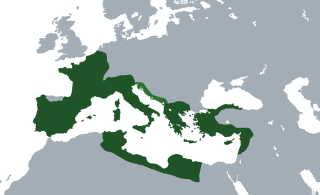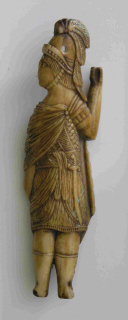 By 44 B.C the Republic had expanded in all directions around the Mediterranean.
By 44 B.C the Republic had expanded in all directions around the Mediterranean. 
The Kingdom of Rome (Latin: Regnum Romanum) was the monarchal government for the city of Rome and its territories from its founding by Romulus, in 753 BC.
When the Romans expanded their territory in the peninsula, they conquered the southern part of the boot and kept the name 'Italoi', from this the Romans used the name 'Italy' for the entire peninsula. The kingdom ended with the expulsion of Lucius Tarquinius Superbus in 510 B.C. and the establishment of the Roman republic.
After the Romans conquered the ancient tribal territories of 'Italy' (510-264 B.C.), they battled for control of the Mediterranean as well as encountering ancient tribes of Europe who had made forays into their newly acquired neighboring territories. The Romans battled with The Gauls, Visigoths, Ostragoths, Burgundians, Lombards and Vandals (of German/Nordic origin and from whom we get the term "Vandalism"), many of these tribes became slaves or warriors living the Roman way of life.
 By 44 B.C the Republic had expanded in all directions around the Mediterranean.
By 44 B.C the Republic had expanded in all directions around the Mediterranean.
This period changed the Roman Pantheistic Way of Life forever when all of these different peoples flooded into Italy bringing new ideas, languages, cultures and religions with them.
Rome's lust for power came with a price, and inevitably there were internal power struggles from 133-27 B.C. With the assassination of Julius Ceasar on March 15, 44 B.C ('Beware the ides of March!'), a new era in Roman History was about to begin - The Roman Empire
References:
Patterns of Civilization - Vol 1. Burton F. Beers.
Gibbons.Rise and Fall of The Roman Empire.
Funk and Wagnalls New Encyclopedia: Italy, History.
Images: Artist's collection.